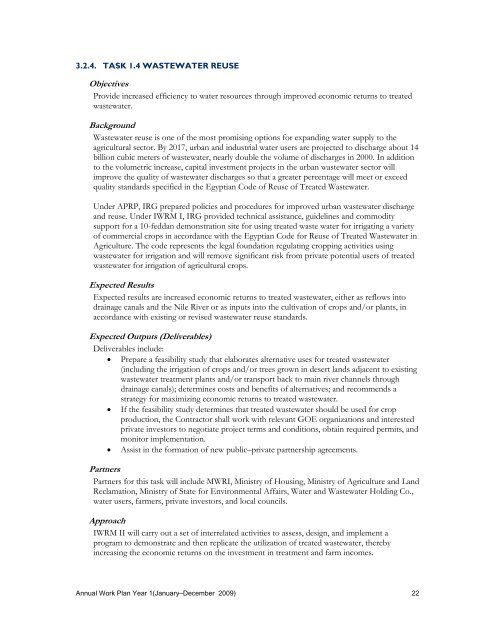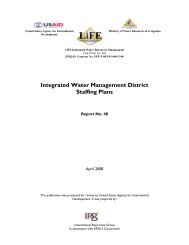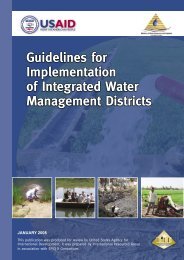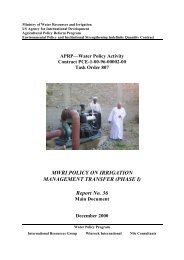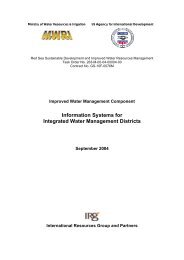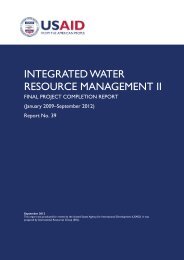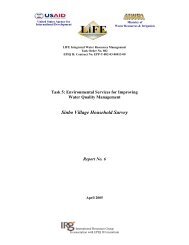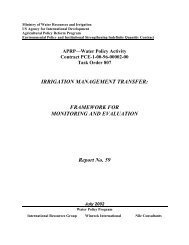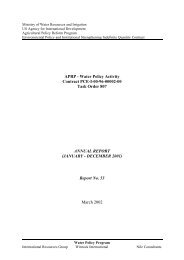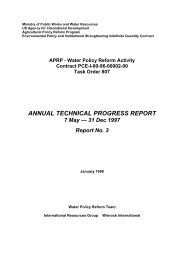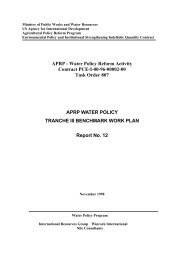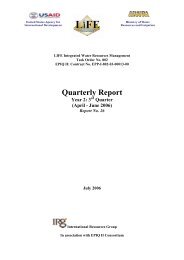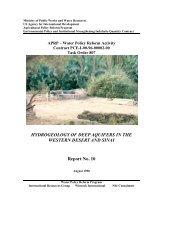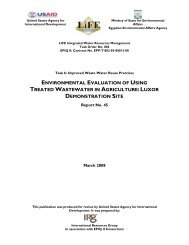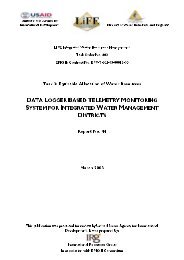ANNUAL WORK PLAN YEAR 1
ANNUAL WORK PLAN YEAR 1
ANNUAL WORK PLAN YEAR 1
You also want an ePaper? Increase the reach of your titles
YUMPU automatically turns print PDFs into web optimized ePapers that Google loves.
3.2.4. TASK 1.4 WASTEWATER REUSE<br />
Objectives<br />
Provide increased efficiency to water resources through improved economic returns to treated<br />
wastewater.<br />
Background<br />
Wastewater reuse is one of the most promising options for expanding water supply to the<br />
agricultural sector. By 2017, urban and industrial water users are projected to discharge about 14<br />
billion cubic meters of wastewater, nearly double the volume of discharges in 2000. In addition<br />
to the volumetric increase, capital investment projects in the urban wastewater sector will<br />
improve the quality of wastewater discharges so that a greater percentage will meet or exceed<br />
quality standards specified in the Egyptian Code of Reuse of Treated Wastewater.<br />
Under APRP, IRG prepared policies and procedures for improved urban wastewater discharge<br />
and reuse. Under IWRM I, IRG provided technical assistance, guidelines and commodity<br />
support for a 10-feddan demonstration site for using treated waste water for irrigating a variety<br />
of commercial crops in accordance with the Egyptian Code for Reuse of Treated Wastewater in<br />
Agriculture. The code represents the legal foundation regulating cropping activities using<br />
wastewater for irrigation and will remove significant risk from private potential users of treated<br />
wastewater for irrigation of agricultural crops.<br />
Expected Results<br />
Expected results are increased economic returns to treated wastewater, either as reflows into<br />
drainage canals and the Nile River or as inputs into the cultivation of crops and/or plants, in<br />
accordance with existing or revised wastewater reuse standards.<br />
Expected Outputs (Deliverables)<br />
Deliverables include:<br />
• Prepare a feasibility study that elaborates alternative uses for treated wastewater<br />
(including the irrigation of crops and/or trees grown in desert lands adjacent to existing<br />
wastewater treatment plants and/or transport back to main river channels through<br />
drainage canals); determines costs and benefits of alternatives; and recommends a<br />
strategy for maximizing economic returns to treated wastewater.<br />
• If the feasibility study determines that treated wastewater should be used for crop<br />
production, the Contractor shall work with relevant GOE organizations and interested<br />
private investors to negotiate project terms and conditions, obtain required permits, and<br />
monitor implementation.<br />
• Assist in the formation of new public–private partnership agreements.<br />
Partners<br />
Partners for this task will include MWRI, Ministry of Housing, Ministry of Agriculture and Land<br />
Reclamation, Ministry of State for Environmental Affairs, Water and Wastewater Holding Co.,<br />
water users, farmers, private investors, and local councils.<br />
Approach<br />
IWRM II will carry out a set of interrelated activities to assess, design, and implement a<br />
program to demonstrate and then replicate the utilization of treated wastewater, thereby<br />
increasing the economic returns on the investment in treatment and farm incomes.<br />
Annual Work Plan Year 1(January–December 2009) 22


